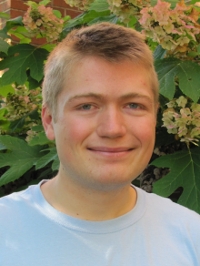2016 SRE Program Participant Profiles: JACOB MILLER
 |
Hometown: Mount Vernon, OH |
Why did you apply to the SRE program?
This seemed like a great opportunity to team more about the process of academic research and pick up some new skills. It's always a good idea to broaden your horizons as well, so meeting lots of new people with similar and different interests felt like a good idea.
What is the purpose of your research?
The objective or my group differs from all the other groups in that we are not really investigating new ideas in science, which makes our group less of a "research" project. We are working on developing games for K-12 students to explain concepts in biology that coincide with the learning objectives of the Biology in a Box program.
What does the research ultimately accomplish?
Ultimately we hope that we can make games for students that 1) inform them about important concepts in science and 2) make learning about these concepts fun and exciting. If a kid plays our games and it makes him or her want to learn more about science, then I would be pretty happy about that.
![]()
There is a great and supportive community at NIMBioS, and everything you are doing has some real significance to it.
![]()
– Jacob Miller, SRE participant
Describe a typical day on the job.
My group and I will meet in the morning for about three hours and discuss progress that we have made and hep each other with problems in our code, or we will give each other suggestions. After lunch, we work separately for a few hours, then meet again to discuss briefly. We meet with mentors or advisors a couple of times a week to talk about progress and make sure our collective vision for the games is coherent.
Do you have an interesting "personal side" to your research experience?
Interesting may be a stretch, but my dad is a computer scientist and my mom is a school administrator, so I guess I have something for both of my parents t o be happy about. My older sister is a biology teacher, and I have two younger siblings just entering middle school, so I have a vested interest in doing whatever I can to improve the education process and make it more enjoyable.
What were your favorite parts of the SRE program?
My favorite parts have been getting to know my fellow participants. They are all such smart, interesting people, it is very gratifying getting to hear their perspectives on things, and seeing their passion for their fields.
What new experiences did you gain that have helped you today?
I have learned so many new skills when it comes to software engineering, especially when it comes to the development cycle of new products. While these skills may seem more technical, I've also learned a lot about trying to balance the goals of people with different visions/goals and different amounts of knowledge about the subject.
What advice would you give someone who's interested in participating in the SRE program?
I would recommend getting to know faculty at your school, or just asking around to see how you can get involved in doing research wherever you are currently. It is always good to know people, for one, and being as active as possible will not only help your resume, it will give you a better idea of your strengths and what you're interested in.
Would you recommend our program to others?
Yes I would, I have enjoyed it a lot. There is a great balance of freedom and structure which makes it the ideal environment to learn about the research process. There is a great and supportive community, and everything you
are doing has some real significance to it.
Related Links
Main SRE page
2016 summer program
NIMBioS
1122 Volunteer Blvd., Suite 106
University of Tennessee
Knoxville,
TN 37996-3410
PH: (865) 974-9334
FAX: (865) 974-9461
Contact NIMBioS


